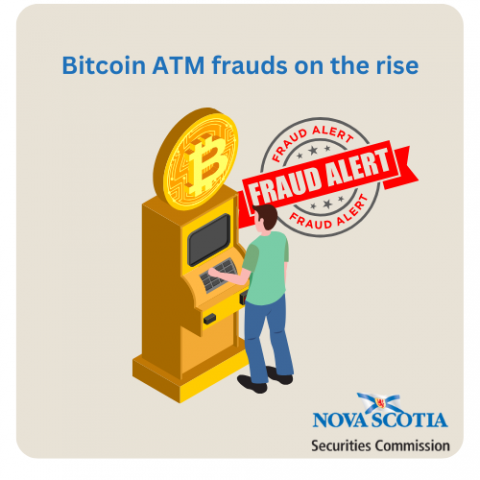Submitted by nsscadmin on

The Nova Scotia Securities Commission has issued several alerts, cautions, and warnings about crypto asset-related frauds in recent years. Canadians continue to lose millions of dollars to these types of fraud. Recently, fraudsters have also been using Bitcoin ATMs or Crypto ATMs to facilitate the theft of money and assets through fraud. This is because transactions using these machines are often anonymous and cannot be cancelled, reversed or refunded. These transactions are also extremely difficult to trace.
A Bitcoin ATM may look like a regular bank ATM, but they do not have safety and protection features that are common with bank ATMs. Some of the protections Bitcoin ATMs lack that make them popular with fraudsters include:
• No limits on daily transaction amounts so there’s no limit to how much you can lose.
• Do not collect customer information for account holders so no one is verifying who you are sending crypto to but you.
• Do not have a pause or resting period on transactions so your assets are transferred away immediately.
• Are not required to register with the government or regulatory bodies so government agencies have a hard time providing assistance with fraud.
• Do not have any fraud prevention or reimbursement policy.
• Often do not provide details about the transaction and where assets are being sent on the receipts.
When using Bitcoin ATMs as part of their fraud, fraudsters will often try to create a false sense of urgency to get a victim to quickly withdraw money from their bank account or use a credit card to purchase crypto assets at the ATM. The fraudster will provide the address for a digital wallet, or a QR code linked to a digital wallet and instruct their victim on how to transfer the crypto assets from the ATM. Some ways they will create this false urgency include:
- Posing as a love interest – Romance scams often use Bitcoin ATMs and the immediate needs for money for travel, illness, or emergency to request money be sent quickly.
- Posing as tech support – Fraudsters may pose as tech support from a well-known reputable company claiming they have detected a virus or threat on a computer or mobile device. They will request and gain access to the computer or device and then hold it ransom, demanding the victim use a Bitcoin ATM to send them money.
- Posing as a financial representative or law enforcement personnel - Fraudsters will claim to be calling from the victim’s bank or impersonate a law enforcement officer and claim the victim’s account has been involved in illegal activities and they need to move their funds out before they are confiscated or frozen. They will direct the victim to withdraw money from their bank account and “temporarily” convert it to crypto asset using a Bitcoin so they can deposit it later in a different bank account.
- Text message or online messages - Fraudsters will send random text message or a direct message on a social media platform to develop a relationship with unknowing victims. They work to gain the victim’s trust over weeks, or even months, and then pitch some type of crypto asset investment that they guarantee will be highly profitable. They will direct the victim to use a Bitcoin ATM to invest in the scheme. The fraudsters will continue to engage with the victim and repeat investment pitches until they have separated the victim from their entire life savings.
- Fake pop up ads - Fraudsters create pop-up advertisements offering a fake anti-virus protection program. If the victim calls the customer service number in the ad, the fraudsters will try to convince them their device has been hacked and they need to convert the cash in their bank account to crypto asset using a Bitcoin ATM to safeguard their money.
If anyone you’re dealing with requests that you use a Bitcoin ATM for an investment, to pay a fine, or to protect your money, be extremely cautious as it may be fraud. Anyone who contacts you regarding investments that require you to use a Bitcoin ATM should be reported to securities regulators. All other fraud that use Bitcoin ATMs to steal money from individuals should be reported to local police or RCMP.
